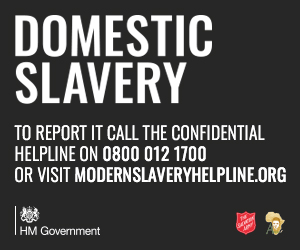It might be hard to believe that slavery still exists, but it does. And it’s happening very close to home.

In the UK domestic slavery is a growing concern. This type of exploitation happens when a victim is forced to do work such as cooking, cleaning or looking after children in unacceptable conditions in someone’s home for little or no pay and with no – or limited – freedom. Recent stories from victims outline how they were forced to sleep on the floor, had to eat scraps of food, and were denied the right to an education. Victims will often have their passports taken from them and be made to work from morning to night, suffering physical or sexual abuse and be forced to live a lonely and isolated existence.
It’s an issue affecting many nationalities, particularly Nigerians, and we must all work together to stop this.
In a new campaign, charities including The Salvation Army, AFRUCA and Unseen, are calling on more people to come forward and report signs of domestic slavery. For example, you may notice someone who stands out from other members of the household. They may be quieter, tired, more anxious or less well-dressed. Questions to ask yourself could include; are they working overly long hours as a house-help? Do they seem less well-fed than other family members? Do they have access to medical care when they need it? Are they allowed contact with friends and family members? Don’t assume they will always be locked away in a basement either. Victims may be allowed out of the house to complete their chores, for example taking the children to school, or buying groceries for the household. However, often threats and blackmail from their ‘employers’ mean they are afraid to leave.
In order for The Salvation Army to provide support to victims of domestic slavery, they rely on calls to their referral helpline. Concerned members of the public can anonymously call the number, and give details of a situation they are worried about.
In order to tackle domestic slavery, we need more people to phone the confidential helpline to report their concerns. But making a call may seem daunting, so what happens when you do? Some people worry about friends or family finding out but the line is entirely confidential. Nobody will know you who made the call, and for the victim, your concern for their welfare could make all the difference.
Once reported, there is a huge range of support available for the victim. Every situation is different but once a referral has been made from the victim or someone on their behalf, The Salvation Army will try to either speak to the victim over the phone, or meet them in person and help them tell their story, so they can be recognised as victims and get the help they need. If the victim is still with their ‘employer’ this will be arranged so as not to put the victim in danger – either by finding a neutral public place away from the ‘employers’ or by calling at a time when they know the call won’t be intercepted.
Norree Webb, who helps support victims of modern slavery, says: “The victims I meet are often fearful; they are emotional and need support in order to talk about what has happened to them. I say: what has happened to you is not ok, if you come forward, you will be helped, you will be listened to, and you will be kept safe.”
Once First Responders like Norree have spoken with the victim and confirmed they are in situations of domestic slavery, Referral Officers will step in to help to coordinate a support plan.
This will usually involve assigning a transport team to collect victims from their place of rescue or escape and taking them to a safe house. Transport team members are all volunteers who give up their time to help victims.
“I find the whole process personally rewarding” said David Craik, who works in a transport team with his wife. “The best feedback is the smile on people’s faces and the hug they want to give you as they feel they have been cared for.”
However, it doesn’t all end once the rescue mission is complete and the victim is in a safe place. Long term support helps victims to recover from their experiences and become independent. This could involve everything from counselling to help accessing medical support. . Victims are also supported to assist police investigations if they wish.
One survivor said: “I am grateful for being able to escape the abusive and torture [sic] situation. I feel blessed with all the support I have and knowing what I have achieved, from where I was to where I am now, is a blessing for me.”
If you suspect that someone you come into contact with might be a victim of modern slavery and need support, please call The Salvation Army’s 24/7 confidential referral helpline (0300 3038151) or visit the website https://www.salvationarmy.org.uk/modern-slavery.
Kindly follow us on twitter:@AfricanVoice2









